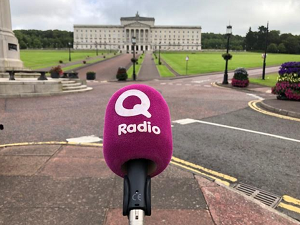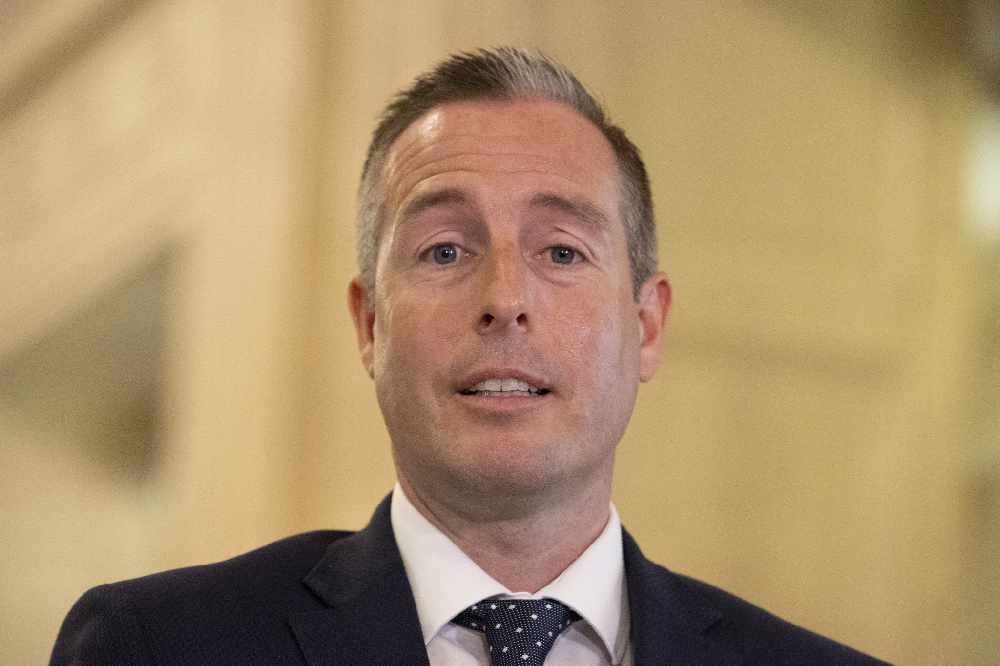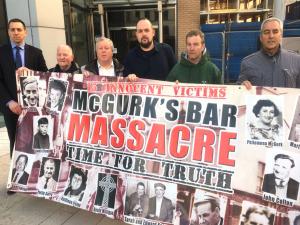
Q Radio News/PA
The commissioner for historical institutional abuse victims has expressed sadness after her evidence session at Stormont was cut short due to a lack of MLAs in attendance.
Fiona Ryan, Commissioner for Survivors of Institutional Childhood Abuse, appeared virtually before the oversight committee for the Executive Office on Wednesday afternoon.
She gave her introductory remarks which included updates on the work of her office, views on the long-awaited public apology to abuse survivors and future plans.
However, MLAs were unable to question her because the number present fell below the required quorum, with just three MLAs left in attendance.
Victims group Savia tweeted: “Totally unacceptable behaviour from highly-paid MLAs. Not having the decency to stay, to listen to HIA victims issues from Commissioner Fiona Ryan. They walked out, so in essence our voices were not heard. Invalid business at the TEO Executive Committee today. Thanks a lot.”
Speaking after the meeting, Ms Ryan said she was saddened there had been no opportunity to answer questions.
“I am saddened that this was the case given the important issues around HIA that were due to be discussed at this meeting. I have heard from several survivor group representatives this evening who expressed deep hurt and upset that the session was abruptly cut short,” she said.
“On the same day that the First and deputy First Ministers announced a review of the HIA Redress Board is finally under way, this committee session was very timely. We are now five years on from the Hart Report and survivors of HIA have yet to receive an apology and some have expressed serious issues with the redress process.
“I was at the committee today to raise these points but sadly there was no opportunity to have these important discussions. Once again, survivors are telling me that they feel let down and that their voices are not heard or acknowledged.
“I would like to place on record my thanks to those committee members who did attend and hope that this meeting can be re-scheduled as soon as possible.”
Committee chair Sinead McLaughlin issued an apology to victims after the evidence session was cut short.
“I am embarrassed by what took place today – it should never have happened,” she said in a statement after the meeting.
“What kind of message does this send out to survivors, who have been often left feeling let down and abandoned during their quest for truth and justice? We were dealing with issues around an apology and redress at this meeting, which need to proceed with the utmost urgency. Victims should not have to wait a minute longer and certainly not because MLAs did not turn up to committee, or left during a presentation.
“While I understand the time of year and many MLAs have busy schedules it’s completely unacceptable that this happened.”
 First Minister Paul Givan
First Minister Paul Givan
Earlier, First Minister Paul Givan and deputy First Minister Michelle O’Neill announced the start of a review of the redress process for victims and survivors of historical institutional abuse.
Compensation is being paid to people harmed in residential homes run by religious orders and the state in Northern Ireland following the opening of the fund last year.
By the end of November, 2,199 applications had been received by the Redress Board; determinations totalling £32.2 million had been made and some £28.8 million paid out in redress.
However, many abuse survivors have contended the process of applying for the redress has retraumatised them.
Mr Givan said: “Victims and survivors of historical institutional abuse have endured dreadful pain throughout their lives. We owe it to them to ensure they not only get the compensation they deserve, but that the process to receive redress is designed and equipped to meet their needs.”
Ms O’Neill added: “Thousands of victims and survivors have made applications for redress and we know there are many more who have yet to come forward. We must listen to, and act on, the voices and experiences of those who have been through the process to ensure it is compassionate and fit for purpose.”
During the committee meeting, Ms Ryan said the review should be progressed in parallel with preparations for the full public apology to survivors and resources allocated appropriately in recognition of the urgent nature of these matters,
“Victims have waited long enough and it’s incumbent upon the Executive to deliver on these commitments,” she said.
A public apology is among the recommendations in the report following the Historical Institutional Abuse Inquiry five years ago.
Ms Ryan told MLAs there were mixed views regarding the apology, with some demanding an apology while others felt there was no point.
“Nonetheless the inquiry acknowledged that even with the spectrum of views that they were recommending that the Northern Ireland Executive and those responsible for each of the institutions investigated where systematic failings were found should make a public apology,” she said, adding that of those she has spoken to that do not seek an apology, they recognise its importance to others.
“This is about survivors, it’s about their lives, it’s about acknowledging what happened to them. It’s about state and the institutions being accountable.”
The commission has been operating for one year, in which time Ms Ryan said they have received over 519 inquiries, half of which related to redress.
She said a year on, she wants to reach out to abuse survivors living in Great Britain.
“I recognise that we need to do more to increase awareness and I’m raising the need for the Executive Office and the need to provide an integrated awareness raising campaign that reaches out not only to survivors here in Northern Ireland but also in Britain and in the Republic of Ireland,” she told MLAs.
“I further advised the Executive Office to consider and implement this campaign as a priority in order to publicise redress services and our office and I have been told by the Executive Office in response that it has started scoping a publicity campaign and will be focusing on it in the new year.”
 Fiona Ryan, Commissioner for Survivors of Institutional Childhood Abuse, appeared virtually before the oversight committee for the Executive Office on Wednesday afternoon
Fiona Ryan, Commissioner for Survivors of Institutional Childhood Abuse, appeared virtually before the oversight committee for the Executive Office on Wednesday afternoon


 Swann refuses to rule out resigning if budget is not changed
Swann refuses to rule out resigning if budget is not changed
 Fresh inquests ordered into deaths of 15 killed in McGurk’s bomb blast
Fresh inquests ordered into deaths of 15 killed in McGurk’s bomb blast
 Trial ends after man accused of murder of young showjumper is found dead
Trial ends after man accused of murder of young showjumper is found dead
 A brief hearing and chaotic scenes as Donaldson makes first court appearance
A brief hearing and chaotic scenes as Donaldson makes first court appearance